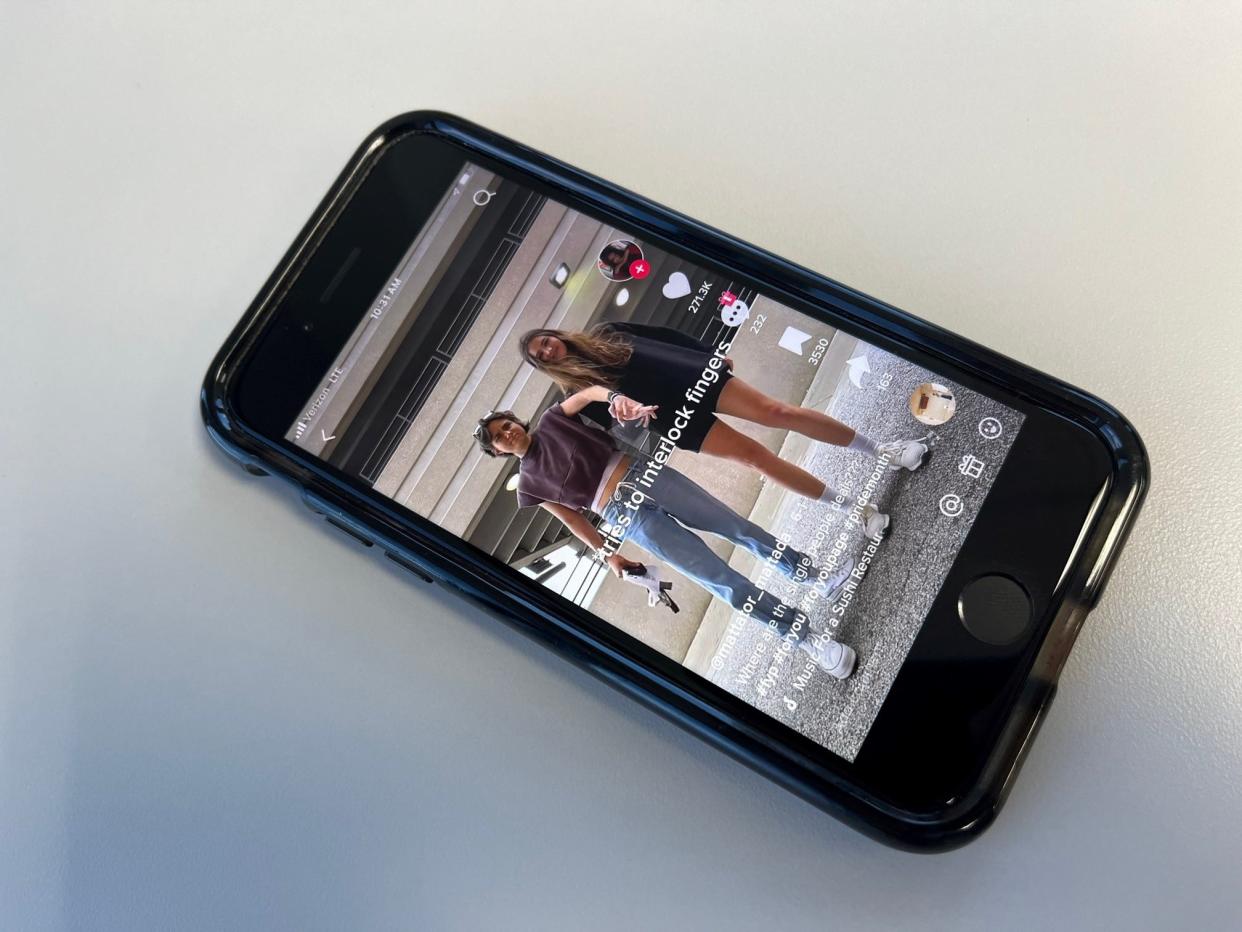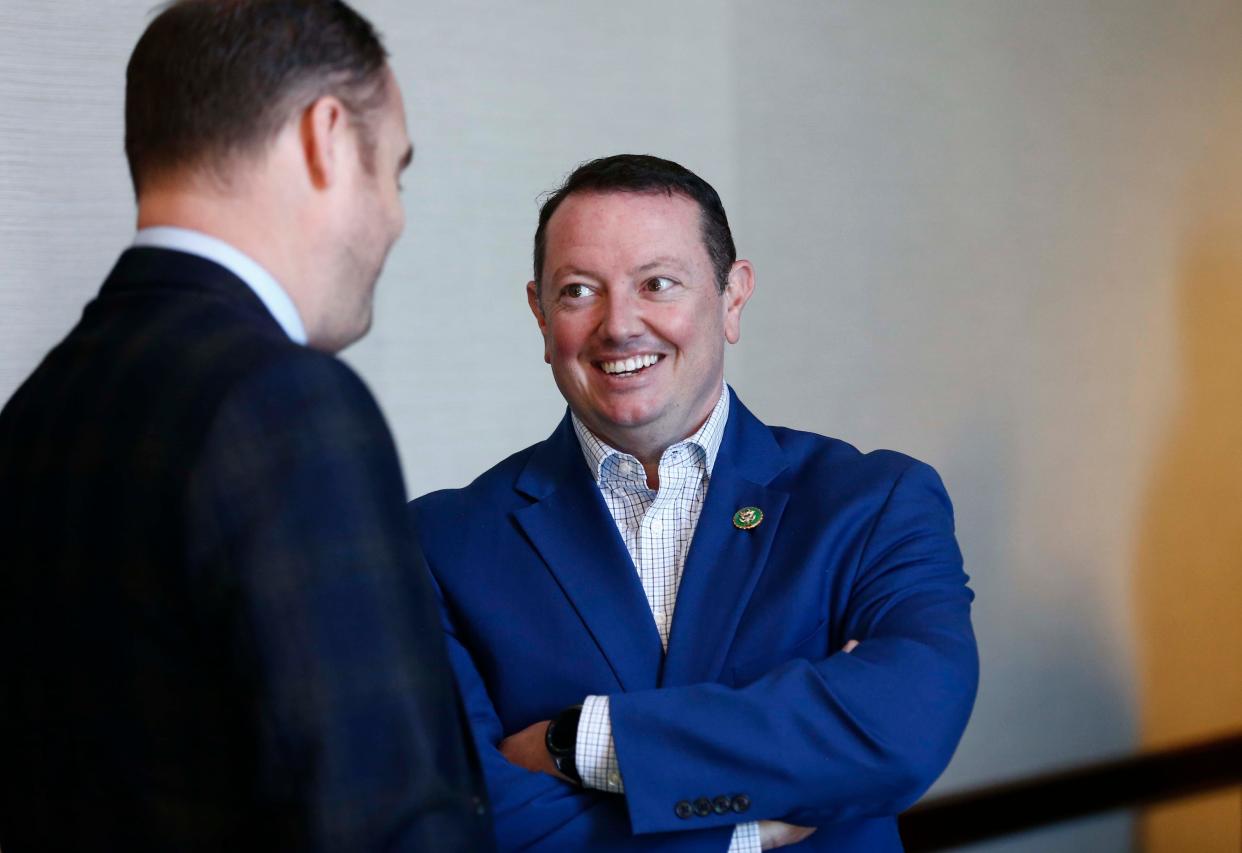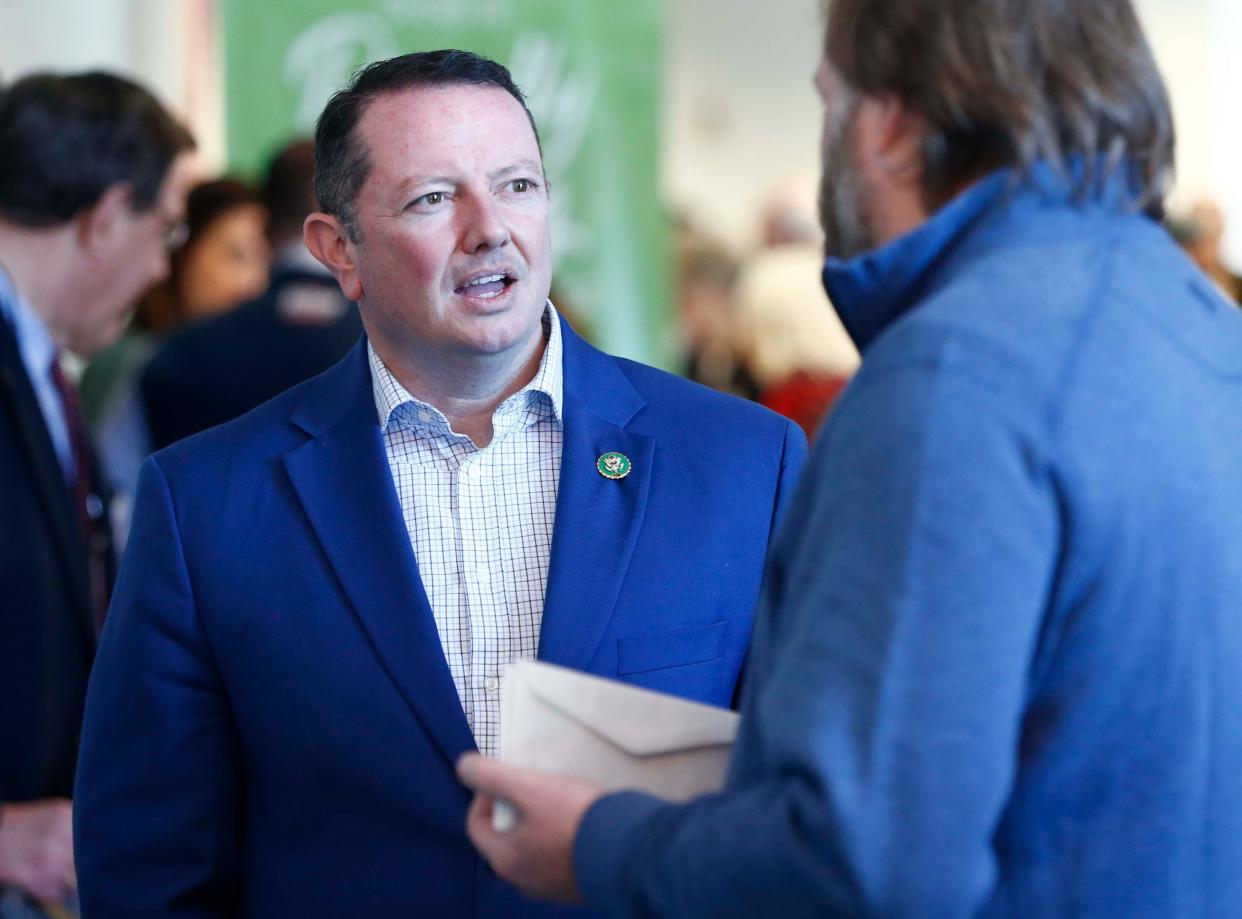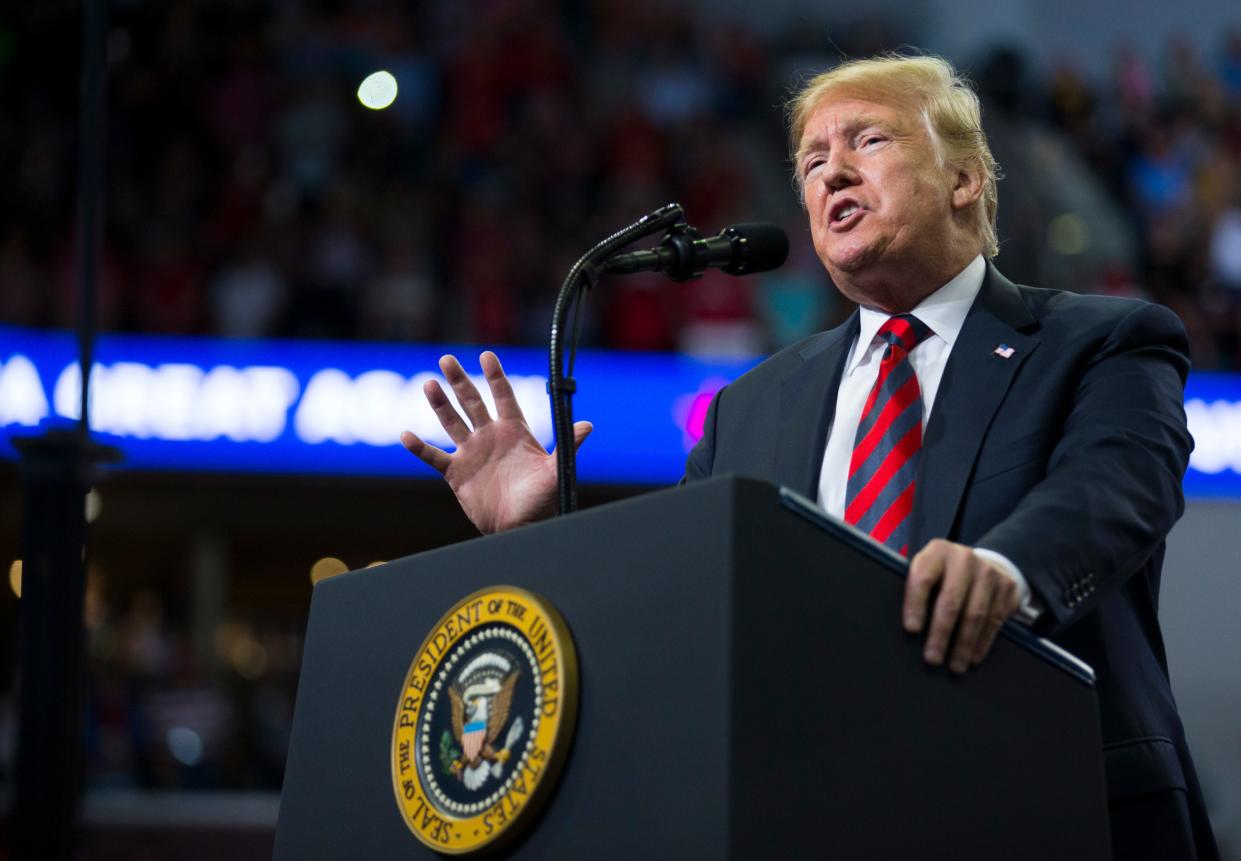Springfield business owners, creatives share concerns about proposed TikTok ban
Aaron Schekorra described TikTok's impact on his small business as "life changing."
Schekorra, executive director at The GLO Center in Springfield, owns and operates Own Your Pride, an online LGBTQIA+ pop-up shop. Since he started selling products through TikTok last year, Schekorra said about 75% of his business' sales come from the platform. But now, Schekorra and countless other business owners and creatives are wondering about the future of the social media platform, as it faces scrutiny from the federal government.
On March 13, the U.S. House of Representatives passed a bill — with a vote of 352-65 — that, if approved by the Senate, could force TikTok's Chinese parent company, ByteDance, to sell the social media platform or face a ban in the U.S. Additionally, the new owners must not be based in countries adversarial to the U.S., including China, Russia, Iran or North Korea.
At the heart of the issue are concerns that, if requested by the Chinese Communist Party, TikTok would have to turn over information about its American users. Under a 2017 Chinese law, the government has the right to any personal data collected by companies that could be relevant to China’s national security.
In December 2022, ByteDance fired four employees for accessing private data on two journalists in hopes of discovering the origins of a report that was leaked about the company, according to reporting by The Washington Post.
If enacted by Congress, the U.S. legislation would give ByteDance 180 days to sell the TikTok platform to a new company, although there has been talk that the timeline could be extended by the Senate, if finding a new buyer in six months proves too daunting.
If ByteDance was unable sell the platform in time, it would become illegal for app stores, including the Apple App Store and Google Play, to offer TikTok for download. It would also require internet service producers to make TikTok inaccessible on U.S. internet browsers.
Released by ByteDance in 2016, TikTok is popular for its short-form mobile videos. Known for its scrolling algorithm, the platform allows users to post videos that range from 3 seconds to 10 minutes long. The app provides users with different filters, backgrounds, music and stickers to add to their videos.
In March 2023, TikTok reported that more than 150 million Americans use the app and the company employed nearly 7,000 employees in the states.
More: TikTok isn't banned — yet. Here's what to know about the proposal moving through Congress
Potential for a 'significant hit' to business
In July 2023, Schekorra began using TikTok Shop, an e-commerce program provided on the platform, to sell Own Your Pride products. During its most successful month, Own Your Pride made about $50,000 via TikTok Shop sales. While sales vary per month, Schekorra said on average, he makes about $30,000 per month via TikTok Shop, with an additional $10,000-$15,000 coming from the Own Your Pride website through TikTok promotion.

When he initially heard about the legislation, which was introduced in early March, Schekorra said he didn't take it seriously, as similar legislation has been discussed in the past. But the U.S. House's approval caught his attention.
If the bill were to be enacted and Schekorra were to lose access to TikTok, he said Own Your Pride would experience a "significant hit" financially, and he isn't sure where he'd turn to next.
"Truthfully, there is just not a platform that will be a direct substitute for my business," Schekorra said.
In the meantime, Schekorra said he is going "all in" on TikTok.
More: Aaron Schekorra's latest venture, Queerly Caffeinated, blends love of coffee, LGBTQ advocacy
"I upped my ad spend this month, and I'm creating a plan to get out lots of organic content in the next few months," Schekorra said.
In addition to the impact on his own business, Schekorra said the bill could have a lasting impact on cities like Springfield.
"Why is it worth taking away the significant economic benefit that this platform has to be bringing to communities like Springfield?" Schekorra asked hypothetically. "We're paying local tax dollars, but I'm bringing in money from literally all over the country — money that Springfield would not be seeing (without TikTok). And countless other creators are doing the same thing."
Small business owners aren't the only ones thinking about how the bill could impact their income.
Twenty-four-year-old Makeala "Mak" Ingemi has been posting videos on TikTok since about 2019. She has more than 3.4 million followers on the platform.
A Springfield native who now lives and works in Los Angeles, Ingemi said her "primary source of income" is from brand deals on TikTok and Instagram. When a creator like Ingemi establishes a brand deal, she makes an agreement with a company to make a set number of posts promoting its product for a set rate.

For example, one of Ingemi's latest brand deals depicts her promoting Bloom Nutrition, a supplement company. The video had more than 49,600 views on TikTok, as of Friday. Ingemi has also worked with companies like clothing brand TomBoyX, bedroom linen store Bedsurehome and glasses subscription service Zeelool.
TikTok offers services like the Creator Makerspace and Creator Fund, which allow users to make money through the platform directly, but Ingemi said she hasn't had much success with these. She's made more money "connecting with brands that align with (her) values." She did not disclose how much money she earns from brand deals.
When asked how a ban on TikTok could impact her livelihood, Ingemi said she thinks it would force users to explore different ways of sharing their work, whether that be through a small business, selling artwork or other creative content.

"I think that for a lot of people, myself included, social media, you never really want that to be the end all be all for what you do, whether it's an extension of your business and you use it in that way or its an extension of creativity for you," Ingemi said. "A lot of managers and creatives really push to ... use social media as a bounce board for that. I think that if this does end up going through, it will definitely force artists to do that as quickly as they can with the knowledge that they only have access to that platform for a certain amount of time."
If the bill were enacted, users who have the app on their devices would still have access to it, but banning TikTok from app stores would prohibit future software updates.
What do Missouri congressional members think of the TikTok bill?
The TikTok bill needed at least two-thirds of the representatives to approve it in order to pass, due to the fact that it was advanced using a “suspension of the rules,” meaning the legislation was fast-tracked to a floor vote after passing out of the House Committee on Energy and Commerce just days before.
Of Missouri’s representatives in the U.S. House, only Democratic Rep. Cori Bush voted against the bill. Republican Rep. Ann Wagner did not vote on the legislation.
“Today, I voted NO on a deeply flawed bill that was rushed to the floor and threatens to ban TikTok,” Bush said in a post on X. “This is not responsible governance. Instead of targeting one company, Congress should enact comprehensive data privacy legislation.”

Rep. Eric Burlison supported the legislation and feels that the platform's current ties to China present a national security risk.
"I think that if you're going to maintain a free republic, you cannot continue to allow a Trojan horse software like TikTok to exist in the United States," Burlison said.
He raised concerns that ByteDance is changing algorithms on TikTok to advance political goals, including displaying content sympathetic to Hamas in the ongoing conflict with Israel in Gaza.
"We know that TikTok has been fully engaged in that propaganda battle by manipulating the algorithms 50-to1 — 50-to1 propaganda in favor of Hamas is being pushed out on TikTok platforms," Burlison said.
He added that he believes this has radicalized young people to believe falsehoods about the conflict between Israel and Hamas.
"Whenever I look out my window, and I see young people protesting who are espousing falsehoods, complete lies, and the question is, 'Where do you hear all this information?' — it's sources like TikTok," Burlison said.
Sen. Josh Hawley has been a vocal supporter of banning TikTok, saying in a March 14 interview with Fox News that “the time to ban Tiktok in the United States has long since passed.”
“The truth is, we need to put Americans back in charge of their own media,” Hawley said. “We don't want China owning American media. I don't want them owning American farmland, owning American industry. We need to put Americans back in charge of all of those things.”
Missouri representative weighs in on message from platform
On March 7, just days before the House voted on the bill, TikTok sent out a notification to its users about the prospective ban, urging users to call their representatives and ask them not to vote in favor of the bill. Following the vote in the House, TikTok again urged users to contact their senators to ask that they not support the bill, flooding Congressional offices with calls from concerned users.
Rep. Blaine Luetkemeyer, who represents Missouri’s 3rd Congressional District, raised concerns that the platform's mobilization of young voters to contact Congress is a sign of TikTok’s power over its users.
“If the Chinese Communist Party was able to mobilize an army of misinformed kids to call Congress in just a few hours, what would be possible in the event of a real crisis?” Luetkemeyer asked hypothetically in a post on X.
The message to users stated: “Congress is planning a total ban of TikTok. Speak up now — before your government strips 170 million Americans of their Constitutional right to free expression. This will damage millions of businesses, destroy the livelihoods of countless creators across the country, and deny artists an audience. Let Congress know what TikTok means to you and tell them to vote NO.”
Luetkemeyer also took issue with some of the phrasing in that message.
“Notice how they said call your government not our . . . read between the lines," his post on X concluded.

Burlison also raised concerns about TikTok's messaging to its users prior to the vote on the bill.
"To me, that's a startling example of TikTok getting political, using their platform in such a way to mobilize political advocacy," Burlison said.
He said that for him and other representatives already planning to support to bill, the message "really only strengthened our resolve to realize that something has to be done."
"If TikTok wants to continue to exist on people's phones in the United States, it can do so — they just have to divest themselves of the Chinese Communist Party," Burlison said.
Concerns with remaining platforms
Heidi Mae Herrington, a Springfield-based creator who has more than 236,700 followers on TikTok, expressed concern about being limited to other social media platforms. She began using TikTok in 2020 and enjoys it because, to her, there are fewer regulations for users than Meta-owned platforms like Facebook and Instagram. Specifically, she cited Meta's "pay to play" format.
Last year, Meta launched Meta Verified, a program that allows users to pay a subscription fee and receive more perks. For $12-$14 a month, Meta Verified users receive "increased visibility and reach, with prominence in some areas of the platform, like search, comments and recommendations," according to a Meta news release.

"On TikTok, the algorithm is so, so good," Herrington told the News-Leader via email. "It gives you the type of content that you want to watch, instead of the type of content that has been paid for you to watch. That results in your creative art being seen by the people who would really enjoy consuming it and seeing it."
In March 2022, the Washington Post reported that Meta hired the Republican consulting firm Targeted Victory to run a campaign against TikTok, one of its major competitors, by portraying it as a danger to American children and society.
Like Ingemi, the bulk of Herrington's income is made from brand deals. She said more recently, these brand deals have been exclusive to content posted on TikTok.
"That is where the people are, that is where the views are and that is where the brands want to be seen," Herrington said.
TikTok users express confusion with legislation's purpose, pace
Like many users who have shared their confusion about the bill, Schekorra said he's still unsure of its purpose. He doesn't believe "national security" is enough of an answer.
"As an individual who values my freedom of speech and ability to access information, banning a platform without stating why its a national security threat does have political consequences to our ability as the public to access information in a way that we understand," Schekorra said. And while he doesn't believe the bill is a part of a bigger plan to affect this year's presidential election, he does find its timing "strange."
For Ingemi, her concern is less with the bill itself and more with how quickly the federal government is moving it.
"There are a lot of things (people) from all walks of life in the country have been asking our government to focus on, yet they seem to be prioritizing what they want to handle, be it a threat or not," Ingemi said. "I think the bigger issue is that people in this country are time and time again not really being listened to with what we want. It just feels odd to see something that's just essentially a platform for free speech and creativity being taken care of in such a fast-paced way."
TikTok no stranger to government scrutiny
This is not the first time TikTok has been in legislative crosshairs. In August 2020, former President Donald Trump attempted to ban the app through an executive order using economic sanctions to forbid transactions between ByteDance and U.S. citizens. Trump raised concerns about national security and protecting the data of American users.
In January 2021, just days before he left office, Trump also banned transactions with eight other Chinese apps, including Alipay, CamScanner and WeChat Pay. Trump’s prohibitions on financial interactions with these companies was rescinded in June 2021 when the White House dropped the executive orders but ordered its own investigation into data security with these firms.
TikTok was banned from government-issued phones in December 2022, when Biden signed it into law as part of a larger spending bill. The ban was enacted in March 2023, when the White House ordered the platform deleted from all federal government devices.

Biden has expressed support of the bill and said he will sign the legislation if it arrives on his desk. Trump, however, has reversed course on his feelings about banning TikTok. Just days before the House approved the bill, he said it would only benefit Meta.
“Without TikTok, you can make Facebook bigger, and I consider Facebook to be an enemy of the people,” Trump said in an interview with CNBC on March 11.
Trump added, “There are a lot of people on TikTok that love it. There are a lot of young kids on TikTok who will go crazy without it.”
What does the future look like for the TikTok bill?
The bill now advances to the U.S. Senate; although its timeline in this chamber remains unclear. On March 20, U.S. agencies discussed classified sensitive information concerning the platform’s influence, and several senators have issued calls to be looped in on some of this information before proceeding.
When asked about the timeline for the legislation moving forward in the Senate, Hawley said, “I’m not holding my breath because TikTok, they’ve spent a lot of money buying influence.”
Greta Cross is the trending topics reporter for the Springfield News-Leader. Follow her on X and Instagram @gretacrossphoto. Story idea? Email her at gcross@gannett.com.
This article originally appeared on Springfield News-Leader: Here's why Springfield TikTok users are concerned by proposed ban
